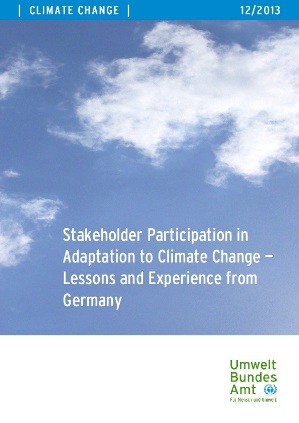Stakeholder Participation in Adaptation to Climate Change Lessons and Experience from Germany
Openness and cooperation is one major principle of the German Adaptation Strategy; the development and implementation of adaptation policies is hence accompanied by broad and diversified stakeholder participation processes. Mainly three German ministries have initiated and supported stakeholder participation: the Federal Ministry for the Environment that has the lead in developing adaptation policies, the Federal Ministry for Education and Research through funding two research programs on adaptation, and the Federal Ministry of Transport, Building and Urban Development through funding regional model projects. A review of these stakeholder integration processes shows that different degrees of participation were realised (communication, consultation, co-production and co-decision) and that both science-based and policy-based approaches were pursued. While science-based approaches aim at improving research results, policy-based approaches target at influencing political decision-making. A broad variety of actors have been involved and almost all 15 sectors mentioned in the German Adaptation Strategy have been covered. While topics such as agriculture or water have been broadly addressed, economic issues have been touched only by a minority of events. Researchers and representatives from administration have participated in almost all events whereas policy-makers, companies and civil society organizations were less represented. The report concludes with recommendations for planning and conducting stakeholder participation processes and suggests suitable designs depending on the pursued objectives.
Download the study (PDF)



